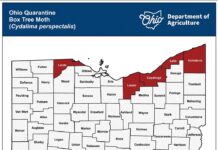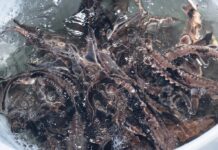SALEM, Ohio — The Ohio Senate unanimously approved its first priority of the year Feb. 18 — a bill appropriately titled S.B. 1 — which creates new water quality regulations for the state.
The bill’s main focus is on preventing the winter application of manure and fertilizer to frozen and snow covered ground in the Western Lake Erie Basin, although the bill also restricts dredging and requires new testing at water treatment plants.
Ohio Sen. Randy Gardner, R-Bowling Green, said the bill is a “responsible, reasonable” approach that balances the needs of agriculture and consumers.
“We need to be about the business of helping our lake and helping agriculture continue their leadership role in helping our lake,” he said.
Many factors
He said agriculture in Ohio is a known contributor to algae blooms, and so are the contributions from Indiana and Michigan, which includes municipal waste and municipal overflows.
The water quality issue drew global attention in August, during Toledo’s two-day drinking water ban.
But Gardner reminded the Senate that state leaders and farmers have been working to address the issue for the past several years. In June, two months before the Toledo crisis, Ohio enacted a new law requiring farmers who apply fertilizer to more than 50 acres, become state certified.
Farm and Dairy watched the session via The Ohio Channel
Sen. Michael Skindell, D-Lakewood, offered his support for the bill, but proposed amending it to include new requirements of the Ohio EPA.
He asked that the EPA establish a safe-level for the amount of harmful toxin (microcystin) in water, require statewide testing of water treatment plants, and mandate reporting to local boards of health.
“We find that the algae blooms are not only an issue in the western basin of Lake Erie,” Skindell said. “It’s also an issue in the central portion of Lake Erie, around Cleveland, as well as Ashtabula and our local lakes and reservoirs throughout the state.”
Gardner agreed with most of Skindell’s testimony, but contested the need for more testing and said the Ohio EPA has adopted the World Health Organization standard of 1.0 parts per billion of microcystin in drinking water.
“I’m not aware of any water treatment plant in this state that is not aware of the concern of toxic algae and microcystin, and is not already testing,” he said.
The amendment was tabled by a vote of 22-10.
Sen. Bob Peterson, R-Sabina, said the bill a “science-based, holistic” approach to the issue. Peterson, who himself is a farmer, reiterated the concerns that farmers have about needing to use nutrients for optimum crop growth, but responsibly.
He said farmers like himself are actually applying less phosphorus than in the past, and with much better precision, but for some reason the water quality problem has not gone away.
“Certainly there are many factors that impact our water and it is sensible policy to take a closer look at areas like our water treatment plants and the dumping of dredge material into Lake Erie, as is done in Senate Bill 1,” said Chad Kemp, president of Ohio Corn and Wheat Growers Association, in a prepared statement.
While the Senate continues its work on water quality, the House is following close behind with a similar bill, known as H.B. 61. The House Agriculture and Rural Development committee continued to hold hearings on the bill this week.
A key issue between the House and Senate bills is whether a five-year review of the regulations should be included.
The Senate bill terminates the prohibitions and their enforcement five years after the bill’s effective
date, unless the Ohio ag committees recommend the prohibitions be continued.
Sen. Lou Gentile, D-Steubenville, said “a review is important” because farm technologies will change over five years, and the bill may need to be updated, but he noted equal concern about how such a review should be done.
Basic provisions in Senate bill:
• Prohibits, with certain exceptions, the application of fertilizer and the application of manure in the western basin of Lake Erie on frozen ground, on saturated soil, and during certain weather conditions.
• States that the prohibitions do not affect any restrictions established in the Concentrated Animal Feeding Facilities Law or otherwise apply to those entities or facilities that are permitted as concentrated animal feeding facilities under that Law.
• Exempts a person in the western basin of Lake Erie from the prohibitions if the person applies fertilizer or manure, as applicable, under specified circumstances, including injecting the fertilizer or manure into the ground and incorporating the fertilizer or manure within 24 hours of surface application.
• Authorizes the director of agriculture or the director’s designee or the chief of the Division of Soil and Water Resources, or the chief’s designee, to investigate complaints filed against a person who violates one of the prohibitions, including applying for a search warrant.
• Authorizes the Director or Chief, as applicable, to assess a civil penalty against a person that violates one of the prohibitions only if the person is afforded an opportunity for an adjudication hearing.
• Requires the amount of the civil penalty to be determined in rules, but prohibits the
penalty from being more than $10,000.
•Terminates the prohibitions and their enforcement five years after the bill’s effective
date unless the standing committees of the General Assembly responsible for
agriculture and natural resources recommend their continuation to the governor.
Related Coverage:
Governor’s budget includes water quality plans.
Senate moving ahead with water quality regulation.










